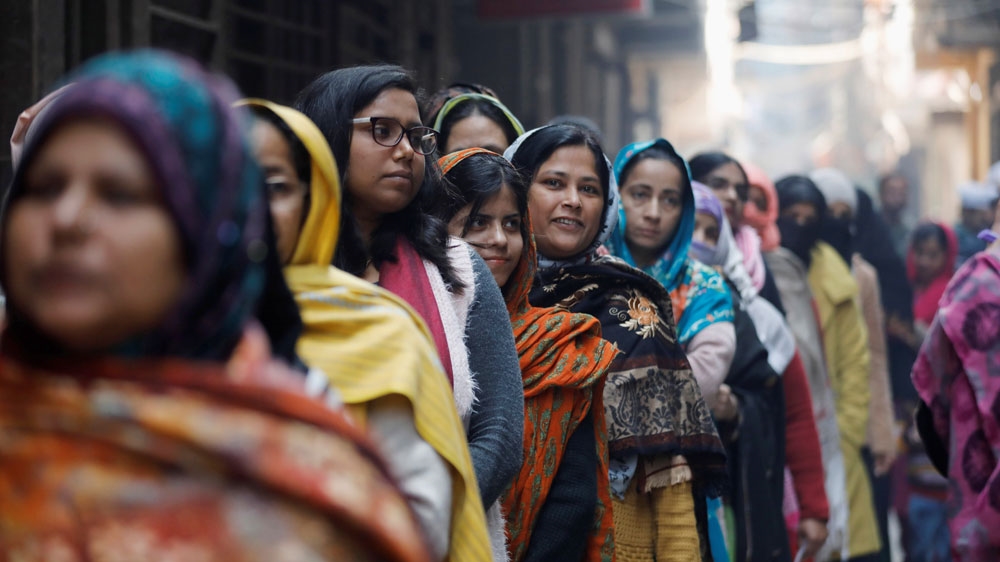Predictions say Aam Aadmi Party will score a hat-trick in national capital, while right-wing BJP may improve 2015 tally.
India’s capital has voted in a crucial state election, with exit polls showing the incumbent Aam Aadmi Party (common man’s party or AAP) led by Chief Minister Arvind Kejriwal is set for a hat-trick victory.
Residents on Saturday lined up in long queues across New Delhi neighbourhoods, where nearly 57 percent of the capital’s 14.7 million voters cast their ballots. Results will be declared on Tuesday.
Exit polls telecast on Indian news channels shortly after the voting ended at 6pm (1230 GMT) predict a strong showing for the AAP, which could win more than 50 of the 70 seats.
In 2015, the party had won a landslide 67 seats, and is now eyeing a second successive five-year term.
Prime Minister Narendra Modi’s Bharatiya Janata Party (BJP), which has not governed the national capital territory of Delhi for 22 years, is expected to win approximately 15 seats.
India’s main opposition Congress party, which governed the capital for 15 consecutive years before AAP unseated it in 2013, is predicted to come a distant third.
AAP, born out of an anti-corruption campaign in 2012, stunned the country by forming the Delhi government in 2013. However, Kejriwal resigned after 49 days when a legislation he was pursuing could not be passed.
The AAP party’s pro-poor policies have focused on fixing state-run schools and providing free healthcare and bus fares for women during its first term.
The Hindu nationalist BJP is trying to regain power in New Delhi after a 22-year gap and a landslide victory in the national elections last year.
In the past two years, the BJP has lost power in key state assembly elections such as Maharashtra, Jharkhand and Madhya Pradesh, raising the stakes even further for it in the Saturday vote.
“They [BJP] have been losing power on the state level for the past 18 months to two years, including in states that are considered the Hindi heartland,” said Al Jazeera’s Elizabeth Puranam, reporting from New Delhi, referring to the Hindi-speaking north Indian states where BJP enjoys most support.
Polls amid anti-CAA protests
The New Delhi election is being seen as a test of Modi’s popularity following months of deadly nationwide anti-government protests against a new Citizenship Amendment Act (CAA) that saw thousands of people take to the streets daily in the capital and across India.
The law makes it easier for non-Muslim immigrants from three neighbouring countries who came to India before 2015 to become Indian citizens, a provision that forces critics to call the legislation anti-Muslim.
The CAA and a proposed nationwide National Register of Citizens have stoked suspicion that Modi wants to turn secular India into a Hindu nation, something his party denies.
In its New Delhi campaign, BJP focused on the passage of the CAA and ran one of the most divisive poll campaigns, with its leaders exhorting people to “shoot” the protesters.
“Two BJP politicians were banned from campaigning after one likened the protesters to rapists and murderers and said they want to turn India into a Muslim country. Another said protesters should be shot,” said Al Jazeera’s Puranam.
The right-wing party also appealed to its Hindu base with actions such as revoking the limited autonomy of the disputed Muslim-majority Kashmir region, and backing a controversial court ruling that cleared the way for the construction of a Hindu temple on a long-disputed site in northern India.
The vote in the national capital also came as India’s economic growth is at its slowest in six years.
A win for the BJP would be hugely symbolic and likely embolden Modi and his party to continue pursuing a pro-Hindu agenda, while a loss could further dent his popularity.
“They [BJP] must be given a jolt. We are poor, but we are also humans. They only talk about divisions,” said Shabnam Mukhtar, a housewife from Shaheen Bagh, a working-class New Delhi neighbourhood where Muslim women have led a sit-in for nearly two months to protest against the CAA.













![Hotstar Premium Cookies 2019 [*100% Working & Daily Updated*] Hotstar Premium Cookies 2019 [*100% Working & Daily Updated*]](https://tahav.com/wp-content/uploads/2019/11/Hotstar-Premium-Cookies-Free-100x70.jpg)



